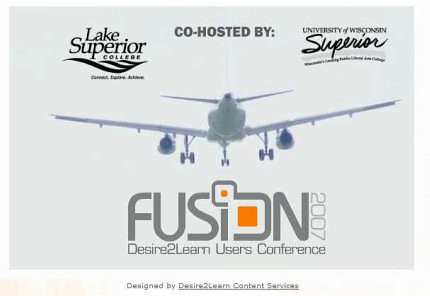FUSION 2007 Desire2Learn Conference
 In July I'll be heading to Duluth, a new city for me, to help add some ideas to FUSION 2007 Desire2Learn Conference. Barry Dahl did a short 15 minute podcast with me as a preamble which you can find here. The topic of my bit will be on Technologies for Communities of practice, a theme you have heard me prattle on for a number of years. I am starting to think about how to contextualize the work, which has been across a variety of context, mostly outside of academia, into the world of K-12 and higher education.
In July I'll be heading to Duluth, a new city for me, to help add some ideas to FUSION 2007 Desire2Learn Conference. Barry Dahl did a short 15 minute podcast with me as a preamble which you can find here. The topic of my bit will be on Technologies for Communities of practice, a theme you have heard me prattle on for a number of years. I am starting to think about how to contextualize the work, which has been across a variety of context, mostly outside of academia, into the world of K-12 and higher education.
Carrying ideas across domains is for me both a useful and somewhat dangerous exercise. Since I am such a fan of context, I realize I need to steep myself more into the educational context.
What communities of practice in K-12 and higher education do you know about? What has been the role of technology in them? I'd love to hear some of your stories.
Oh, and any hints about what to see in the Duluth region are also gratefully accepted. I'm taking my husband and we are going to take a few days of holiday while we're up there.

6 Comments:
Speaking for higher ed, I think most communities of practice still revolve around disciplines. Within those disciplines, there are sub interests, which may be a narrower focus of the discipline or may be a focus on teaching or even technology.
But there are also people like me, technologists who connect with other technologists via blogs, conferences, etc. My own community draws on people in the tech world, people in higher ed, people in k-12, faculty, teachers.
One thing I think many in higher ed haven't quite gotten yet is the power of technology to connect people. It's still a pretty small percentage of academics who blog, who participate in wiki work or other online ventures. I find my online community invaluable and would feel totally isolated without it. Right now, I think there are a few (maybe a lot) faculty who feel that way.
A couple of good communities I know about: science blogs-particularly at Seed Magazine and the cliopatra history blogs. Most of the others I know of are informal. I hope that helps.
Laura, thanks for the thoughtful input. You have my mind going on some ideas. I very much share your idea that this starts at a point of being about connection. The second point you raise is the adoption process... when will there be a tipping point and this horizontal learning and collaboration become more the norm?
Hey Nancy. Just discovered your blog, from a Beth Kanter link.
Maybe I'm missing the point but I saw the Duluth reference and had to comment.
Duluth is a great town. Definite things to do:
1. Drive Skyline Parkway all the way across town for fantastic views of the shipping ports, St. Louis Harbor, Lake Superior, etc. Total 12 miles?
2. Drive Scenic 61 east of town to the New Scenic Cafe. I have no idea of your tastes, but the New Scenic is excellent, local, good food and a fantastic atmosphere.
3. Keep going. The north shore is really pretty.
Enjoy the conference!
Duluth is lovely. It used to be called "a mile high and a mile wide" because it really jumps up out of Lake Superior. My grandmother lived on East 8th St, and I have many fond memories of the area.
I echo the Skyline Drive recommendation. The views from Enger park and the tower at the top of the hill are fantastic.
Dip your toes into the (surprisingly cold) lake at Park Point park. You'll get to go over Duluth's famous aerial lift bridge.
If you are into short boat rides, the cruises through around the harbor are interesting: coal, grain, ore, a ride under the lift bridge.
If you want to hike, have a look at the walk down from Chester Park along the creek that flows out of the park. I always loved that trail and watching the creek tumble down the rocks. I remember it as being not an easy trail.
If you are going to head north (actually northeast) along the lake, be sure to take the scenic drive right along the lake instead of the highway of Rt 61. North of Two Harbors is Split Rock Lighthouse and state park.
Fantastic recommendations, Eli and Jack. That cafe's website has me drooling already and I am forwarding this all to my husband to get him into planning mode!
Nancy, here's an irony about some higher ed folks, not all of them want to learn new things. About anything. Part of why I love higher ed so much is that you're encouraged to learn. And I learn from people everywhere, manly via the internet. If you can tap into people's desire to learn (because many really do still have that desire), I think you can convince people of the need to connect and then you might be able to get the adoption process going. Things move slowly in higher ed. People have to *think* so much about stuff before they do anything. :)
Post a Comment
Links to this post:
Create a Link
<< Home